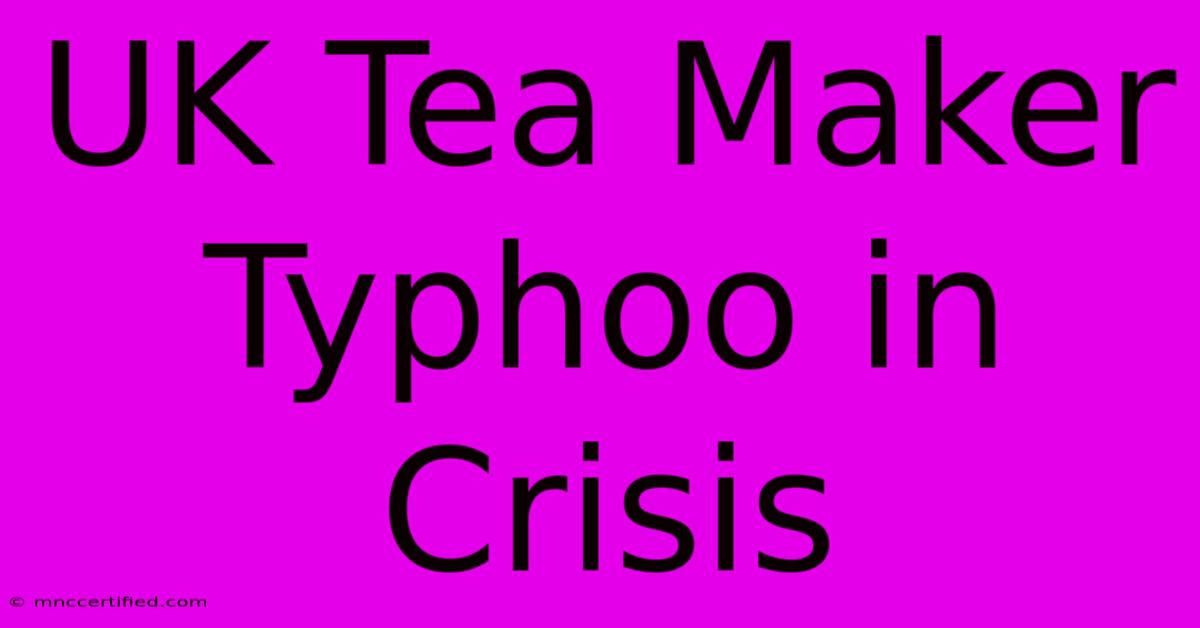UK Tea Maker Typhoo In Crisis

Table of Contents
UK Tea Maker Typhoo in Crisis: Navigating a Stormy Brew
Typhoo, a UK household name synonymous with tea for generations, finds itself facing a turbulent period. This article delves into the challenges facing the iconic brand, exploring the factors contributing to its crisis and analyzing potential paths to recovery.
Declining Sales and Shifting Consumer Preferences
One of the most significant headwinds Typhoo is battling is the decline in overall tea consumption in the UK. Younger generations are increasingly turning to alternative beverages like coffee, herbal infusions, and even fruit-infused waters. This shift in consumer preferences presents a considerable challenge for a brand heavily reliant on traditional tea drinkers. Typhoo's struggles highlight a wider trend within the UK beverage market, emphasizing the need for adaptation and innovation. Competition from both established brands and emerging players further intensifies the pressure.
The Rise of Specialty Teas and Ethical Sourcing
The rise of specialty teas and a growing consumer demand for ethically sourced products adds another layer of complexity. Consumers are becoming more discerning, seeking out unique tea blends, organic options, and brands with transparent and sustainable practices. Typhoo, while possessing brand recognition, needs to address these evolving expectations to remain competitive. This includes reviewing their supply chain transparency and considering a wider range of ethically sourced and unique tea varieties.
Brand Revitalization and Marketing Strategies
To navigate this crisis, Typhoo requires a comprehensive brand revitalization strategy. This involves more than just updating packaging; it requires a fundamental reassessment of its target audience and marketing approach. Digital marketing strategies, engaging social media campaigns, and influencer collaborations could be key to reaching younger demographics and regaining lost market share.
Innovation and Product Diversification
Expanding beyond traditional tea offerings is crucial. Typhoo could explore product diversification, introducing new lines such as herbal infusions, fruit teas, and ready-to-drink beverages. Innovation in packaging and sustainable practices could also attract environmentally conscious consumers. This strategic diversification not only broadens the customer base but also provides resilience against fluctuating demand for traditional black tea.
Financial Challenges and Potential Solutions
The financial implications of declining sales are significant. Typhoo needs to address its cost structure, improve operational efficiency, and potentially seek external investment to support its revitalization efforts. Exploring potential mergers or acquisitions could also provide access to new resources and market segments.
Rebuilding Consumer Trust and Brand Loyalty
Ultimately, Typhoo's success depends on rebuilding consumer trust and brand loyalty. This involves transparent communication, a commitment to quality, and a demonstrable dedication to sustainability and ethical sourcing. Highlighting the brand's heritage and history, while simultaneously showcasing its forward-looking approach, will be crucial in this process.
Conclusion: A Steep Climb Ahead
Typhoo's current predicament is undoubtedly challenging, but not insurmountable. By proactively addressing the factors contributing to its crisis and embracing a strategic approach to brand revitalization, innovation, and marketing, Typhoo can potentially navigate this stormy brew and secure its future in the ever-evolving UK beverage market. The brand’s success hinges on its ability to adapt quickly, understand consumer shifts, and effectively communicate its values and commitment to quality. Only time will tell if Typhoo can successfully navigate these challenges and reclaim its position as a leading tea brand in the UK.

Thank you for visiting our website wich cover about UK Tea Maker Typhoo In Crisis. We hope the information provided has been useful to you. Feel free to contact us if you have any questions or need further assistance. See you next time and dont miss to bookmark.
Featured Posts
-
Standards Watchdog Probes Krugers Funds
Nov 29, 2024
-
2024 Macys Parade Where To Watch
Nov 29, 2024
-
Hopper Trip Insurance Reviews
Nov 29, 2024
-
Watch Heidenheim Vs Chelsea Conference League
Nov 29, 2024
-
Cheap Car Insurance Temple Tx
Nov 29, 2024